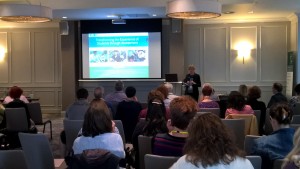May
2016
SEDA Spring Teaching and Learning and Assessment Conference 2016 Innovations in Assessment and Feedback Practice 12th -13th May 2016 Edinburgh
Keynote Changing the culture of assessment and feedback through TESTA Professor Tansy Jessop, Professor of Research Informed Teaching, Southampton Solent University
Tansy was one of the original project team for this methodology started at Winchester. During the project time 75 programmes were audited, 2000 assessment experience questionnaires were used and 90 focus groups. A case study was then produced for each programme and given to each programme team.
Post HEA project funding this has continued to be a popular project and grows across institutions with the top cities for use being London and Edinburgh in UK. This methodology shifts the focus of discussion about assessment and feedback positively from ‘my’ module to ‘our’ module and programme and away from individual modular design to coherent team design. There is also a shift from teacher focus to student experience.
TESTA addresses 3 key problems which are:
1 Knee Jerk
The NSS assessment and feedback sections do have reduced scores nationally and individuals have done many things to improve this but these are not connected so the scores are perpetuated.
2 Curriculum Design
This accentuates the ability to be disconnected and divided and the curriculum privileges knowing stuff.
3 Evidence needed to action problems
A study in the US by Wobash found that there are some misguided assumptions which include the problem is a lack of data. Proving something is different to improving.
TESTA found in the projects that some programmes had 40 – 48 summative assessments usually with 6,000 words per module but only 5 – 19 formative assessment which was often a ratio of 1:8. When feedback was analysed it was found that in three years students had from 936 – 22,000 words of feedback. There were 11 = 15 types of assessment. Too much effort was in the wrong place. Examinations were 22 – 31% of the assessments. There was a need to streamline and reduce summative assessment and connect formative assessment. It is usual to have two assessment per module and we know that attendance dips around assessment.
The language needs to be shared with students and in the public domain. We need to use risky, creative and challenging assessments but related to the real world. Mass education has led to anonymous feedback which has no relationship with the student. Technology offers a range of formats for assessment and feedback.
What is needed is iterative cycles of reflection over modules. Feedback needs to change from telling students to feedback as asking questions. Assessment has not developed with the teaching to draw on the latest pedagogies and move from transmission to socially constructed models of assessment.
